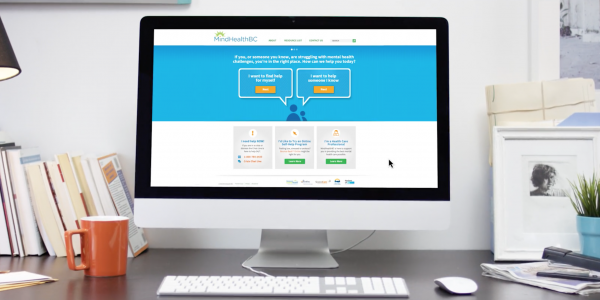Making it easy to find help for depression and anxiety
Over his more than 30 years as a family doctor, Dr. Garey Mazowita encountered patients with mental health concerns on a daily basis.
“Mental health conditions are absolutely pervasive in primary care and it was always clear we would benefit from additional resources,” he says. “Dealing with mental health was and is a major part of all family practices.”
New site launched
Earlier this week, VCH launched an online resource that will make it easier for individuals with mental health and substance use issues find the help they need. MindHealthBC is a one stop shop, a resource for common mental illnesses such as depression and anxiety that are frequently found in the general public.
MindHealthBC gathers the wealth of evidence-based resources available and puts them together into one easy to use website. This includes local support groups and health services as well as online information pages and workbooks provided through BC Partners for Mental Health and Addictions Information, and self-help or supported self-help programs such as the BC Canadian Mental Health Association’s Bounce Back® Online. MindHealthBC will also integrate with the Kelty Online Therapy Service at VCH when it launches. In addition to resources for individuals experiencing challenges with mental health and substance use, MindHealthBC will also link to valuable resources for friends and family members seeking information for their loved ones.
“Depression and anxiety can be effectively treated with psychological treatments and yet access to free psychological services is limited within BC” says Dr. Lakshmi N. Yatham, the Medical Lead for the VCH/PHC Regional Department of Psychiatry and Physician Lead for the MindHealthBC project. “In addition to providing easy navigation to in-person services within Vancouver, Richmond, and Coastal communities, MindHealthBC will also provide free access to online cognitive behavioural therapy based programs, which research studies show can be just as effective as face to face care for many individuals.”
Empowering people
“The focus is on the self-management of high-prevalence mental health conditions,” say Drs. Mazowita and Yatham, “It’s intended to empower people to help themselves or at least point them in the right direction for other resources. We’re hoping we can eventually triage individuals who need additional help to more tailored, personalized resources, including an appropriate clinician where needed.”
“It’s an important strategy to make mental-health care – especially self-directed care – more accessible to people,” they add. By making programs available online, it will be more broadly available and therefore help more who need it.
Still stigma
Dr. Mazowita says that while we’ve come a long way, there still is much stigma attached to mental illness and substance use, which can create reluctance to seek care. Access to a self-directed website is less likely to be impacted by stigma.
“There’s a huge interest in making primary mental health care more accessible and acceptable …especially self-management tools that more people can use – we know self-management is strategy that works. People who have busy lives can use online tools to address many of their mental health symptoms. This website should prove helpful.”
See the site
Check out the MindHealthBC website now!
And don’t forget to follow MindHealthBC on Twitter and Facebook .

